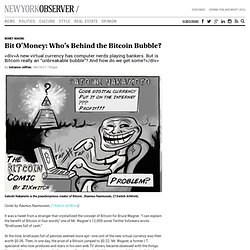

Bitcoin: What Doesn’t Kill it Makes it Stronger. Mt.

Gox is dead, but bitcoin is not. Decentralized currency is here to stay and it will continue to grow, giving people the power to exit the current banking system. As Jeff Tucker wrote here, “The beautiful thing about bitcoin is that it is designed to persist and thrive even in the face of powerful interests that oppose it. It lives on a distributed network that is controlled by no one in particular so that there is no single point of failure.
Web Analytics. Bit Coin Review. Researchers Use Game Theory to Identify Potential Problems for Bitcoin. One thing cannot be disputed about the person (or persons) responsible for creating Bitcoin: they were skilled in math, and expert at coding.

Five years after the Bitcoin software was first released, no major fixes have been needed to the core code, which uses cryptography to generate and transfer virtual money. Yet signs are emerging of more subtle flaws in the vision of Satoshi Nakamoto (which may or may not be a pseudonym), with analysis suggesting the rules governing how Bitcoin operates as a currency may be far from perfect. Some researchers claim that these rules leave room for cheats to destabilize Bitcoin. Others have concluded that major changes to the currency’s rules will be needed as the number of bitcoins in circulation increases. Bitcoin: the hacker currency that's taking over the web. Earlier this week, two senators sent a letter to the US Attorney General, copied to the Drugs Enforcement Agency, alerting them to the existence of an underground website called Silk Road.

Like a lawless eBay, Silk Road users can, according to the senators, "freely purchase and sell illegal drugs . . . from cocaine and heroin, to ecstasy and marijuana". For this they are using the digital currency Bitcoin. Created in 2009 by an anonymous Japanese computer science student using the pseudonym Satoshi Nakamoto, Bitcoin was initially adopted by hackers as a means of bartering services.
Now it is fast becoming the unofficial currency of the web. Amid Bitcoin's Bloodbath, Silence From Silicon Valley Press. As I'm sure you're aware, oil prices have cratered, from $85 a year ago to just $46 today.

Bitcoin. Cracking the Bitcoin: Digging Into a $131M USD Virtual Currency. The $100M USD+ Bitcoin market is experiencing its first major inflationary event.

There's great volatility, but since Friday's drop of 15 percent, the trend has been a reduction in value versus the USD. (Source: Mt. Gox) In some way Bitcoins are like traditional currency, in other ways, they bear more similarity to publicly traded stock. Many individuals are using them to buy and sell goods or services, though, just like a standard currency. Bitcoin miners can make a tidy profit by pushing early adoption, but market volatility creates a level of risk.
Bitcoin protects the users' anonymity with sufficient IP obfuscation. Bitcoins are an exciting development as they offer a unique new economic mechanism. Bitcoin slump shows signs of slowing; misinformation remains widespread. Bitcoin: "real world" currency or speculative investment? The RPC Trainees' Business Blog posted an interesting introduction to Bitcoin last week (seelink).

Much has been made of the few "real world" outlets that will accept payment in Bitcoins, like the Pembury Tavern in Hackney, law firms Nesenoff & Miltenberg and Plasman CS Advocaten (based in Manhattan and Amsterdam respectively), and Cumbria University (which this week became the first public university in the world to accept Bitcoin payment for two new courses examining the role of complementary currencies). However, the announcement earlier this month that online games company Zynga will now accept Bitcoin payment says more about the roots of the electronic currency. Despite its rise to fame in the past 12 months, Bitcoin still has a long way to go before it can be considered a credible alternative to traditional currencies, rather than a novelty for tech-savvy individuals and speculative investors. Bitcoin May Find a Fulfilling Market in Africa. As Internet technology continues to make deeper inroads into regions that lack infrastructure to support a strong banking system, very quickly virtual currencies can become more successful than banks.
One region of the world that reflects this is Africa, where banks are weak, but mobile devices are becoming more and more ubiquitous in everyday life. Recently, the Technology Review published by MIT ran a story about German software developer Rüdiger Koch, a consultant to the U.K. -based bitcoin exchange Intersango, who spoke at the Mobile Money Africa event in Lagos, Nigeria who sees Africa as a fertile ground for Bitcoin development. There, Koch told the audience of businesspeople and government officials that Bitcoin could support a system of robust, low-fee mobile payments for anyone whose cell phone has a camera. Bit O'Money: Who's Behind the Bitcoin Bubble? Satoshi Nakamoto is the pseudonymous creator of Bitcoin.

(Rasmus Rasmussen, Z1Xwitch ArtWork) Comic by Rasmus Rasmussen, Z1Xwitch ArtWork) It was a tweet from a stranger that crystallized the concept of Bitcoin for Bruce Wagner. “I can explain the benefit of Bitcoin in four words,” one of Mr. Wagner’s 12,000-some Twitter followers wrote. At the time, briefcases full of pennies seemed more apt—one unit of the new virtual currency was then worth $0.06. The last time he’d been this excited was when Windows came out.